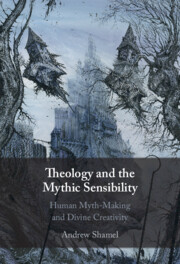
-
Select format
-
- Publisher:
- Cambridge University Press
- Publication date:
- November 2024
- November 2024
- ISBN:
- 9781009542593
- 9781009542609
- Dimensions:
- (229 x 152 mm)
- Weight & Pages:
- 0.48kg, 232 Pages
- Dimensions:
- Weight & Pages:
- Subjects:
- Literature, Literary Theory, Religion, Theology
You may already have access via personal or institutional login- Subjects:
- Literature, Literary Theory, Religion, Theology
Book description
How do stories change the way we see both ourselves and the world? That question is the starting-point of this accomplished new contribution to narrative theology. Dr Shamel addresses what he calls mythopoieic fantasy: the fictionalised myth-making occupying those twilight borderlands between contemporary secularity and a religious worldview. Exploring key writers such as J. R. R. Tolkien, Terry Pratchett, and J. K. Rowling, the author argues that the mythic turn of popular culture signals an ongoing hunger for something 'more': more dense, more present, more 'real'. For Dr Shamel, mythopoieic fantasy and Christian theology represent the same human impulse: a desire to participate in the divine. Despite the avowed secularity of many authors of fantasy literature, the creativity of their mythic fictions reveals something of the theological character of all human making. The stories we tell in order to encounter the world as meaningful, argues Dr Shamel, in fact emerge within a theological horizon.
Reviews
‘The author's setting of mythopoeisis within the larger frame of both narrative and creation theology is notably well done. His engagement with critiques of the power of myth in Bultmann and others is welcome and rare in books on this subject, as is his reading of Gadamer and others. The chapters on mythopoeisis in light of theology of the Logos and Trinitarian theology are all also very good, and his material on Pratchett and Rowling is fresh and original.'
Malcolm Guite - Fellow and former Chaplain, Girton College, Cambridge; author of Faith, Hope and Poetry: Theology and the Poetic Imagination
‘Andrew Shamel's book is an original and insightful scholarly work that reflects theologically on the paradox of our secular culture's fascination with the fantastic – namely, the peculiar form of mythic literature that has captured wider popular attention, Hogwarts and all. The author makes a compelling case that the Christian imaginary underwrites even anti-theist language.'
Kevin Vanhoozer - Research Professor of Systematic Theology, Trinity Evangelical Divinity School; author of Biblical Narrative in the Philosophy of Paul Ricoeur: A Study in Hermeneutics and Theology
‘Shamel argues that human beings encounter the world through the work of myth-making and that this work participates in God’s work of creation … Shamel’s argument lays a rich foundation for further theological work on myth-making … What, then, does it mean to say the work of murderous myth-making does not just echo a distorted form of creatio ex nihilo (a creation towards nothingness, perhaps), but also participates in God’s original creativity, just as Christian myth-making does? What, indeed, does it mean to say that Christian myths have fostered this murderous work, without being made any less ‘Christian’? Shamel’s work lays the foundation for a profound exploration of this question…’
Ed Watson Source: The Heythrop Journal
Contents
Metrics
Altmetric attention score
Full text views
Full text views help Loading metrics...
Loading metrics...
* Views captured on Cambridge Core between #date#. This data will be updated every 24 hours.
Usage data cannot currently be displayed.
Accessibility standard: Unknown
Why this information is here
This section outlines the accessibility features of this content - including support for screen readers, full keyboard navigation and high-contrast display options. This may not be relevant for you.
Accessibility Information
Accessibility compliance for the PDF of this book is currently unknown and may be updated in the future.

